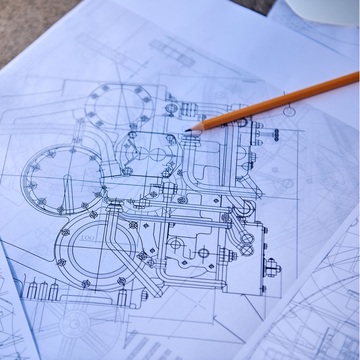
The engineering sector is undergoing a profound transformation, largely driven by Artificial Intelligence (AI). In this article, we look at how engineering has evolved over the years, explore the current state of AI applications, discuss the challenges and opportunities arising from AI integration, predict future developments, and delve into the ethical implications of AI in engineering.
Engineering's Evolution
Engineering has undergone significant evolution over the decades. The 18th century brought with it the Industrial Revolution, characterised by mechanisation and steam engines. The mid-20th century saw the emergence of the Digital Revolution, as engineers began incorporating computers and electronics into their work, focusing on automation and control systems. The late 20th century was the dawn of the Information Age, which led to the rise of the internet and telecommunications. This saw engineers starting to use data-driven decision making in their processes.
The Current Landscape of AI in Engineering
AI is making significant inroads in various engineering sectors:
- Manufacturing: AI-driven robots and automation systems are enhancing production efficiency and quality control.
- Civil Engineering: AI is contributing to urban planning, traffic management, and infrastructure design, fostering sustainable and resilient cities.
- Aerospace: AI algorithms are employed in aircraft design, navigation, and maintenance, improving safety and performance.
- Energy: AI optimises energy generation and consumption, making power grids more reliable and sustainable.
- Predictions for the Near Future
- Healthcare: Engineers collaborate with AI to develop diagnostic tools, medical imaging systems, and treatment optimisation.
- Environmental Engineering: AI aids in monitoring and mitigating environmental hazards, such as air and water quality.
Opportunities Presented by AI
AI is revolutionising the world of engineering, offering a multitude of opportunities that can shape the future of this field. These include:
- Efficiency boosts: One of the most significant advantages of AI in engineering is its ability to enhance efficiency. AI-powered systems can analyse vast amounts of data in a fraction of the time it would take a human. This streamlines processes in fields such as manufacturing and logistics, reducing costs and increasing productivity.
- Improved precision: Engineers rely on precision to ensure safety and reliability in their designs. AI technologies, such as machine learning and computer vision, can assist with intricate tasks like quality control and structural analysis. By improving accuracy and reducing errors, AI helps engineers create safer and better solutions.
- Innovation acceleration: AI enables engineers to explore new frontiers. With AI-driven simulations and predictive analytics, engineers can test and refine designs faster and more thoroughly than ever before. This accelerates the development of groundbreaking technologies, from autonomous vehicles to renewable energy solutions.
Challenges in Merging AI and Engineering
While the opportunities presented by AI in engineering are substantial, they come with their fair share of challenges that must be addressed for a successful integration.
- Technical hurdles: Implementing AI in engineering requires advanced technical expertise. Engineers need to acquire new skills and knowledge to harness the full potential of AI. Added to this, integrating AI systems into existing engineering processes can be complex and may need serious financial investments.
- Ethical concerns: As AI becomes more integrated into engineering, ethical considerations – such as bias in AI algorithms, job displacement and data privacy – become an issue. Engineers must ensure that AI systems are designed and used responsibly to avoid unintended consequences.
- Practical implementation: Changing from traditional engineering methods to AI-driven approaches can be a challenge. In order to effectively adopt AI, organisations must invest in specific infrastructure, tools and training. This shift may be disruptive and call for significant adaptations within the workplace.
Predictions for the Near Future
Artificial intelligence is expected to reshape engineering in several key ways:
- Engineers will use AI to generate innovative designs and simulations, speeding up the prototyping process.
- Autonomous vehicles, drones, and machinery will become commonplace in various engineering applications, which reduces the need for human intervention.
- AI will also play a central role in how energy is used and renewable energy integrated, helping to address our environmental concerns. The same goes for AI-led design of sustainable urban environments.
The Ethical Debate: AI and Accountability in Engineering
One of the major ethical concerns with AI in engineering is accountability. If something goes wrong, it's not always clear who should take the blame. Engineers design AI systems, but they don't always have complete control over how these systems behave.
Another ethical issue is bias. AI systems learn from data, and if that data is biased, the AI can become biased too. For example, if a facial recognition AI is trained mostly on pictures that are gender or race specific, it might struggle to recognise others accurately, leading to unfairness and discrimination.
AI also raises questions about transparency and privacy. It can gather and analyse huge amounts of data. But what happens to that data? Who has access, and how is it used?
The responsibility of engineers, organisations and society is to ensure that AI is developed and used in a way that is fair, transparent, and accountable. In doing so, aspiring young engineers, including those doing an engineering degree, have the chance to be at the forefront of this revolution, using AI for good, and keeping ethical considerations top of mind.
About The IIE’s Varsity College
The Independent Institute of Education (The IIE) of which Varsity College is a brand, is South Africa’s largest registered and accredited private provider of higher education. At Varsity College we understand that no two students are the same or learn the same. That’s why we make sure a student’s education is shaped around them; how they like to learn, what they are passionate about, what makes them tick, and what makes them thrive. Our Education by Design approach allows students to grow into their best, and creates a space where they can live, learn and play – their way. Learn more about engineering studies at the IIE’s Varsity College.